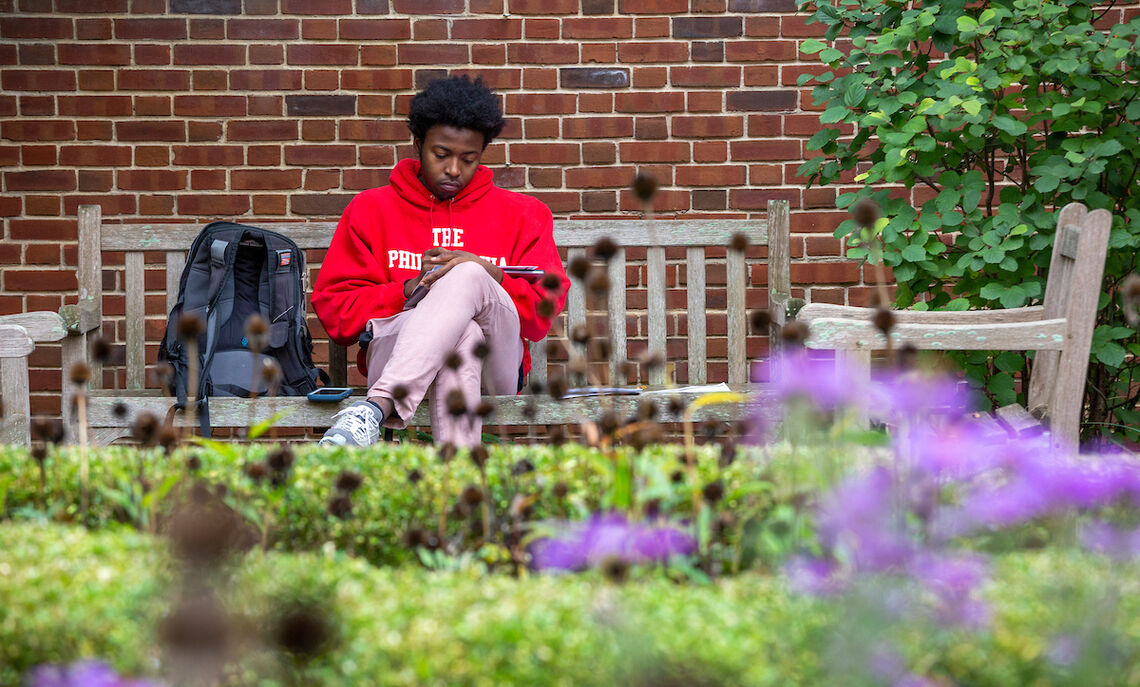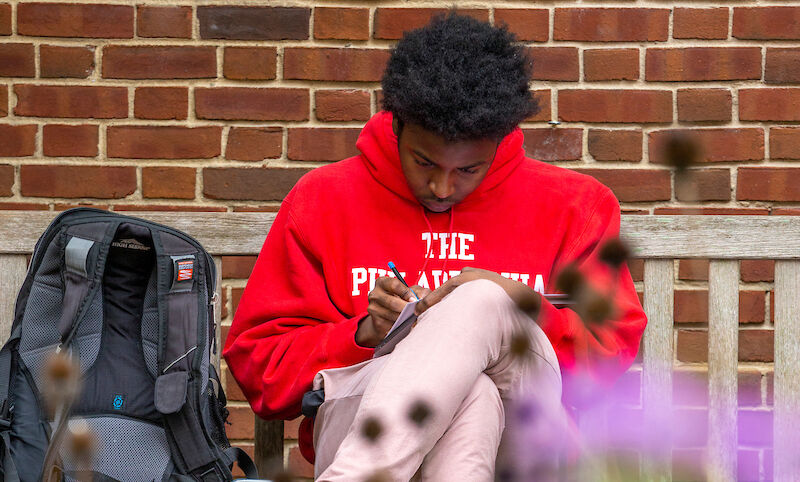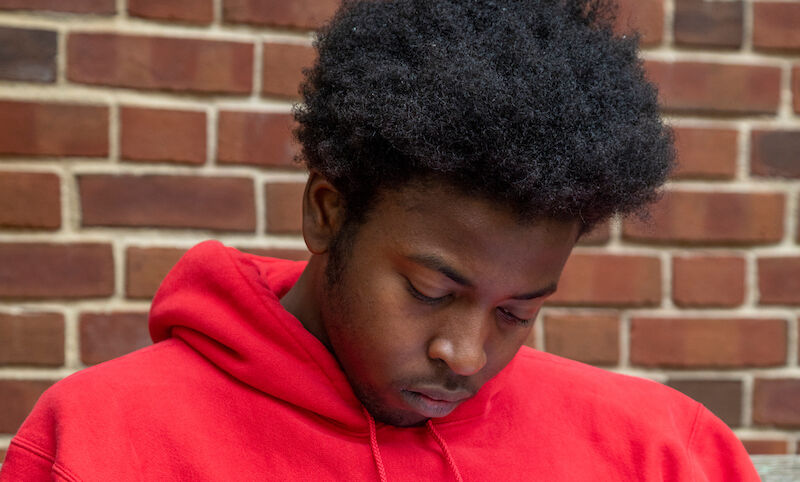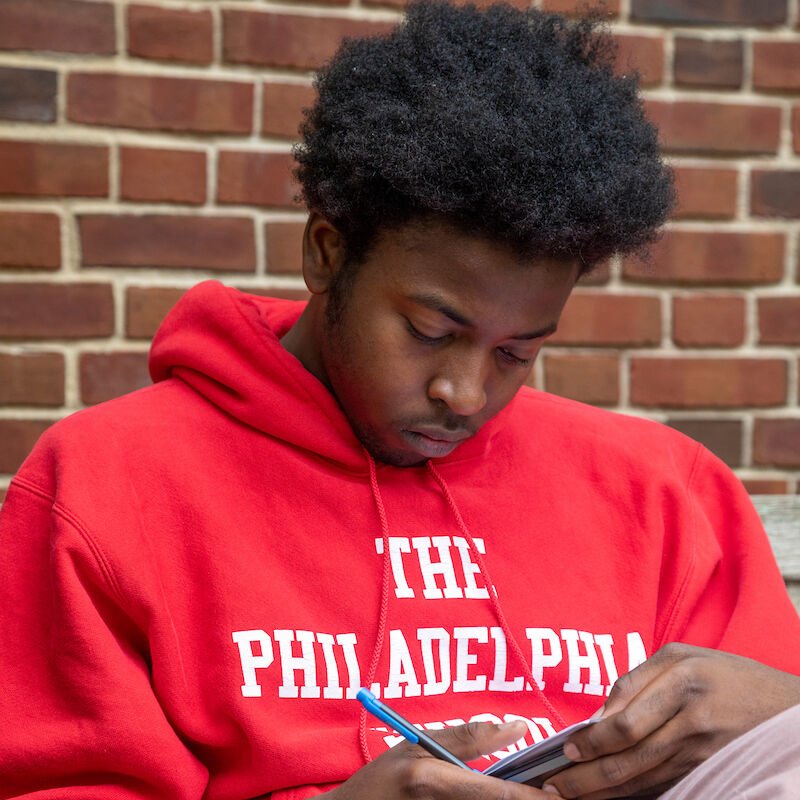F&M Stories
Research Fair: Senior Studies Hope, Solidarity and Cognition
It's a cloudy afternoon in October at Franklin & Marshall. Amid the bustle of students en route to class, Maceo Whatley '22 reads his "Philosophy of Natural Science" class text in quiet contemplation.
Whatley turned to philosophy when experiment-based psychology "just didn't leave me with the kind of answers I wanted," he said.
His fall research supports the quest for those answers, specifically surrounding agency (the capacity for individuals to make their own free choices) and the influence that structures such as social class and ethnicity have on such agency.
The Scientific and Philosophical Studies of Mind (SPM) curriculum at F&M offers two majors: cognitive science and moral psychology. Whatley is majoring in the latter.
In particular, Whatley examined the conditions of hope and solidarity.
Whatley worked with Assistant Professor of Psychology Elana Cuffari and George Fourlas, visiting assistant professor of philosophy and government, on individual projects and an ongoing, joint project centered around microagressions, implicit bias and anti-racist ethics.
"We are attempting, both conceptually and empirically, to investigate obstacles to hope and solidarity. One particular strand of this project concerns the role of implicit bias in everyday conversational interactions," Cuffari said.
Whatley's research drew on methods and literature from moral psychology, philosophy and cognitive science.
He also supported the indexing of Fourlas' recent book, "Anti-Colonial Solidarity: Race, Reconciliation, and MENA Liberation," which he proofread.
Understanding Implicit Bias
Studied in the work of Martin Heidegger, Whatley is drawn to the "existential, phenomenological approach to looking at human existence," he said.
Implicit bias can't be avoided, said Whatley, and should be taken into stronger consideration to better understand the actions of individuals.
"I don't think implicit bias is something that we should morally condemn, but I do think it's something that we should be interrogating and seeing as a necessity if we are to be moral people," he said.
A timely example is considering whether rioters at the January U.S. Capitol insurrection were expressing hope.
"How should we be thinking about their mental states, knowing what they value? It's different than other people showing up and protesting other things. What we're trying to distill is, what is this phenomenon of hoping? And how does that play into what agencies we perceive ourselves as having in interpersonal encounters?" Whatley said.
Ever on the quest for answers, Whatley's research experience at F&M prompted him to think even further about the way his identity shapes daily interactions.
"I would say it made me a lot more curious about the kinds of things that are dictated by our identities. Even just at a very day-to-day, normal level in terms of what our concerns are, what inspires us, what excites us," he said.
A Lyrical Outlet
Senior Maceo Whatley has found another outlet for answers: writing rap music, jotting down lyrics in the margins of his course notes when inspiration strikes. "I want to incorporate that into the issues that matter to me. I'd like my politics and my passions to become more interconnected," he said.
Below are Whatley's lyrics inspired by readings on racial identification and racial identity:
Accustomed to your Ascription,
code-switching, I've tried to fit in
authentic in my convictions,
and yet still I find I'm conflicted,
intrigued at such signs of friction
my biases must be implicit,
as a person, it's bound to happen
you could just dismiss it, but you'll be relapsing.
Discernment: the step towards Refraction.
Related Articles
February 20, 2026
Work on the Wild Side with Lillian Basom '08, F&M Vivarium Director
Lillian Basom ’08 loved Franklin & Marshall’s vivarium so much that she never left. In fact, she has been the director of operations since 2011. The research facility houses a variety of rodents, reptiles, birds, fish, invertebrates and capuchin monkeys.
February 16, 2026
Powering Innovation: Inside F&M’s Campus Supercomputer
Imagine 1,600 computer processors combining power toward one task. This is the engine driving innovation at F&M. Called a High-Performance Computing (HPC) cluster, this elite shared resource accelerates discovery, empowers large-scale research, and fuels the collaborative spirit that defines the F&M experience.
February 6, 2026
From F&M to Film Career: Independent Producer Jesse Hope ’13
Fresh off a premiere at the Sundance Film Festival, film producer Jesse Hope ’13 shares his career path from F&M – from the set of Quentin Tarantino’s “The Hateful Eight” to his own independent features.




